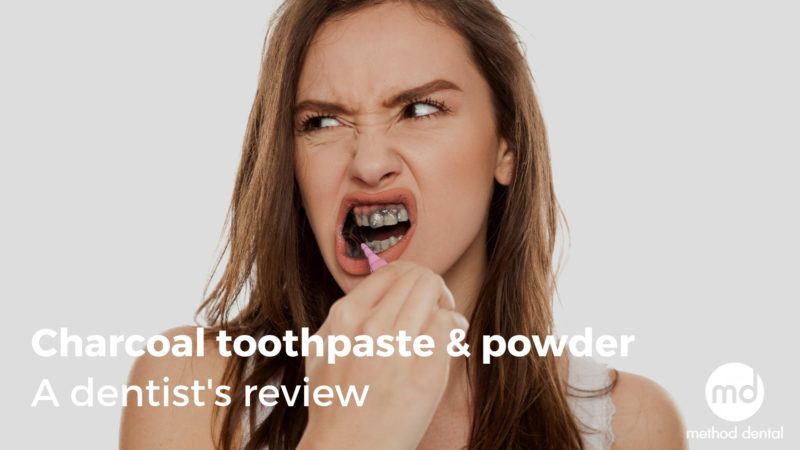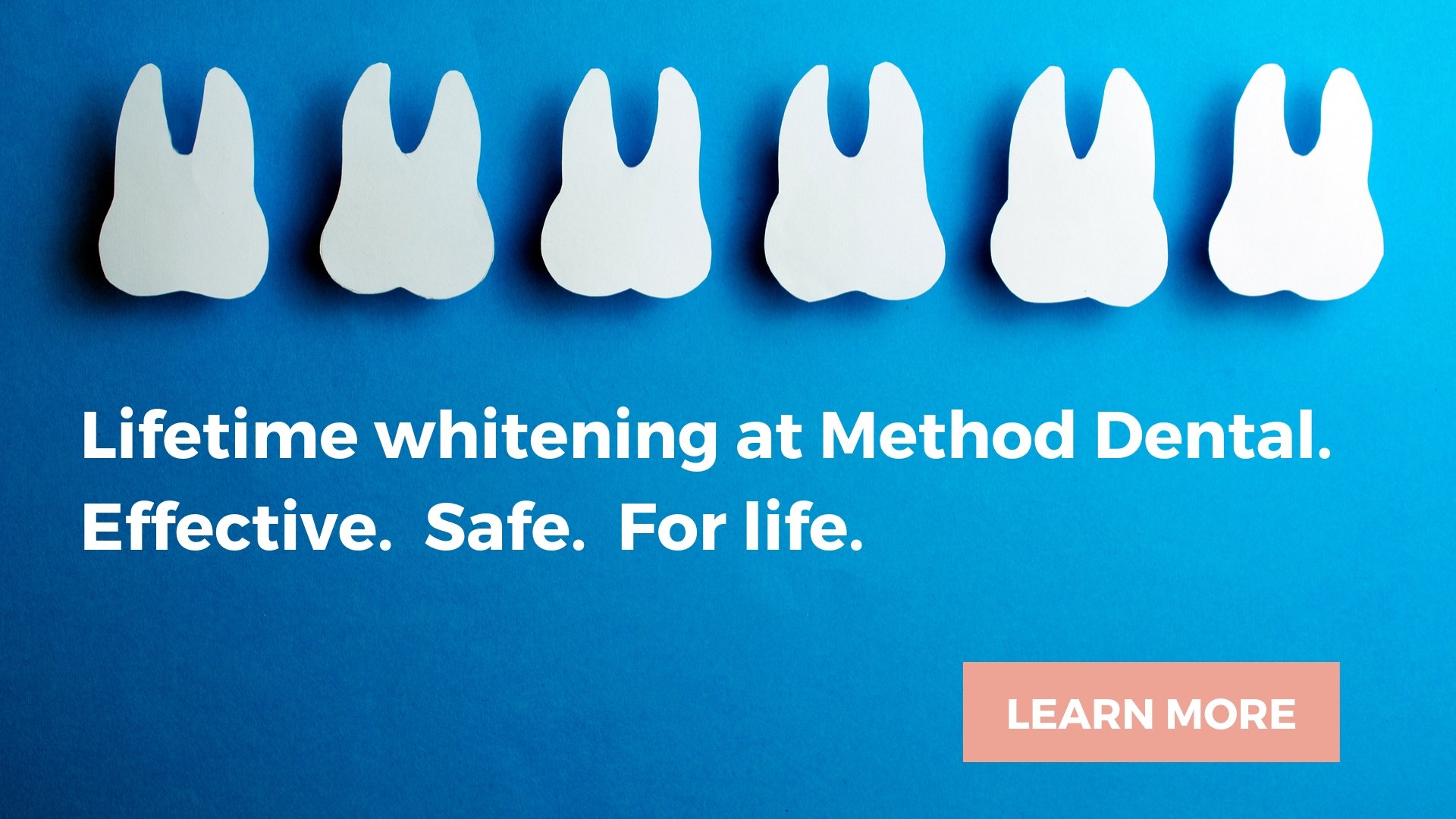Charcoal Tooth Powder Review
By now, you’ve probably seen the hype about charcoal toothpaste and charcoal tooth powders all over the internet. There’s influencers on Instagram promoting these products with big smiles full of black stuff all over their teeth!
But why would someone want to put black stuff all over their teeth? Well, why not when you can use an “all natural” alternative to regular toothpaste that’s supposedly able to whiten your teeth, detoxify your mouth and protect your tooth enamel!?
Do charcoal toothpastes whiten and detoxify teeth?
As a dentist, I always need to keep up to date with the latest advances in dentistry and products available on the market. That way I can make the best and safest recommendations to my patients. But, before I tell you all about my experience with charcoal tooth powder, it’s really important to say two things. Charcoal toothpastes could actually be damaging your teeth! And do not replace your regular fluoride toothpaste with charcoal ones!
Most of the charcoal containing toothpastes on the market do not do not contain fluoride. This can put your teeth at more risk of developing tooth decay. Not only that, most charcoal toothpastes and powders do not test how abrasive they are on tooth enamel and dentine. Even though they may advertise that their products are gentle on teeth and gums, there has been no independent verification of these claims. So, by using these products, you could be damaging your teeth and gums.
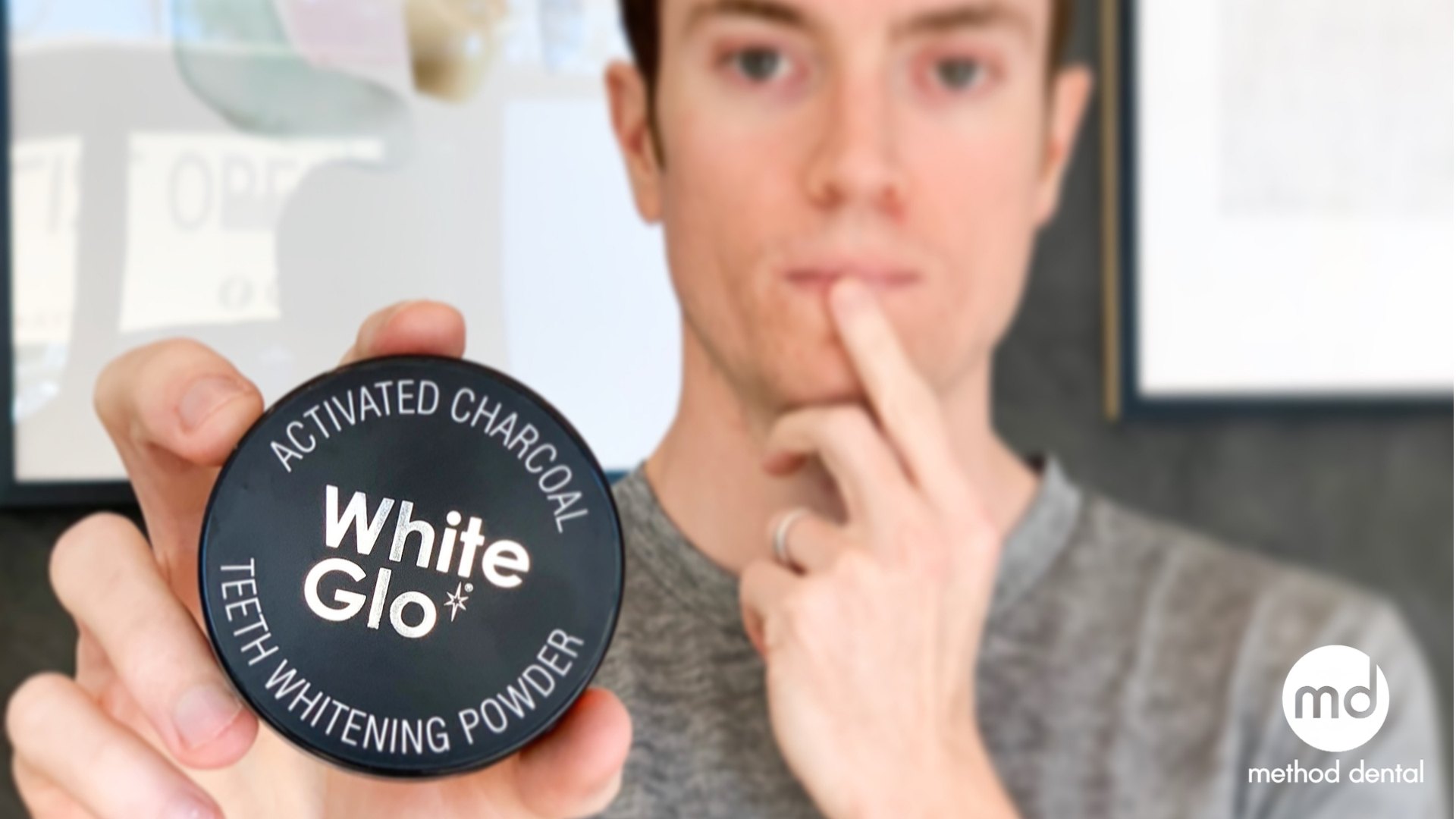
Carbon Coco, HiSmile and Colgate charcoal toothpastes
There are a few brands out there making these charcoal toothpastes and powders. Carbon Coco is probably the most famous at this point and HiSmile are also making their own charcoal toothpaste. I bought one from WhiteGlo from my local supermarket. Colgate have even started making all things charcoal – toothpastes, toothbrushes and even charcoal tooth floss!
The ingredients in the one I bought are listed below. But there’s one ingredient in some charcoal toothpastes and powders that some manufacturers make big claims about: bentonite clay.
Carbon Coco specifically states this ingredient as being able to remineralise teeth, protecting against tooth decay. Their representative on their website also claims that you can safely use their products instead of regular fluoride toothpaste. This is quite a dangerous claim to make.
There is no evidence that bentonite clay remineralises tooth enamel nor that it protects against tooth decay. This is extremely misleading. People can be easily fooled into buying these products, possibly thinking that they are doing something good for their dental health when in reality, they are putting their teeth and gums at risk. Remineralisation of tooth enamel can only happen in the presence of calcium phosphate and fluoride.
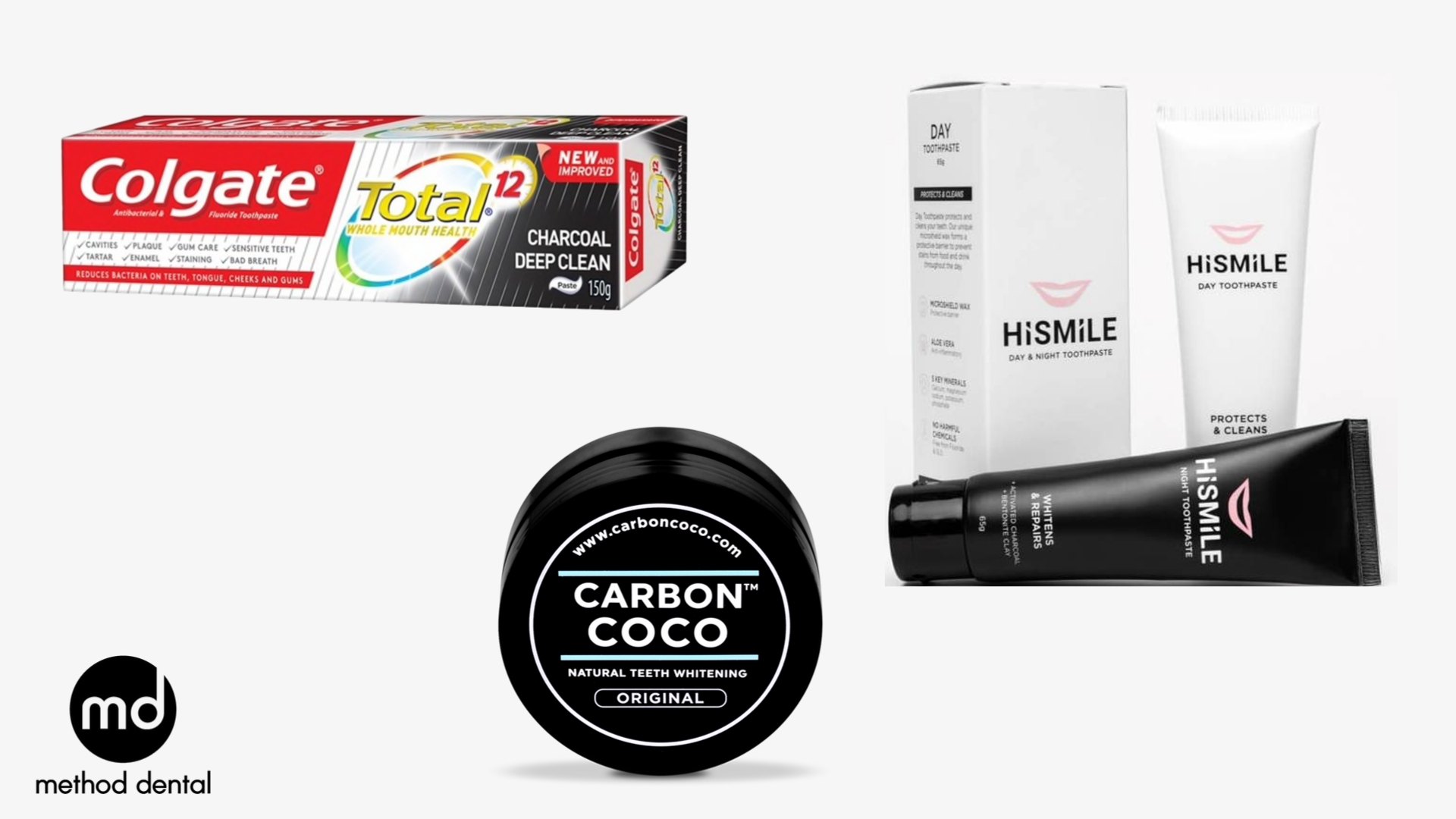
WhiteGlo charcoal tooth powder ingredients
Ingredients listed on the WhiteGlo tooth powder include activated charcoal powder, calcium carbonate, silica, calcium bentonite clay, sodium phytate, sodium citrate and flavours. The ingredients in other charcoal products are very similar, with the possible exception of bentonite clay. Some of these ingredients are supposed to remove toxins, some of them are meant to polish stains from the outside of teeth and some of them are normal toothpaste ingredients like silica.
The WhiteGlo packaging claims that this tooth powder will penetrate and draw out stubborn stains, trap colour particles, fight bad breath and whiten tooth enamel. They do not claim to detoxify your mouth. The instructions also recommend that you use their regular fluoride-containing whitening toothpaste for the best effects. And there’s no mention of fighting tooth decay on the packaging.
We will be back soon with a full breakdown of charcoal toothpaste ingredients and the sensational claims these companies make.
Instructions for charcoal tooth powder
The instructions tell you to place a small scoop (provided) of the powder on a wet toothbrush and brush gently for 2 minutes.
Now, as a dentist, I see one huge problem every day and that is that so many people are already brushing their teeth and gums too hard! Over-brushing is a really common problem (can you believe it?) that leads to the gums shrinking, exposing the roots of the teeth which can lead to tooth decay and sensitive teeth.
The problem with the instruction to “brush gently for 2 minutes” is that almost no one knows what that means. This can lead to people brushing too hard, with a product that’s even harsher on their enamel and gums! No!!! (More about how abrasive charcoal toothpastes are below)

I tried charcoal tooth powder for myself for one month
I used it every night for one month in order to give it a fair chance of working. Colgate Optic White (one of my favourite whitening toothpastes) claims that you’ll see results in one week. So I thought that a one month trial for a product I don’t really know much about was more than fair.
Read about my favourite teeth whitening options here.
Your teeth and mouth are going to look a bit funny with all of the black stuff everywhere and to be honest, it doesn’t feel great. I must admit, my teeth did feel clean after using the tooth powder, but almost too clean. It’s like having a professional polishing at the dentist but the difference is, you get a professional polish at the dentist once every 6 months, NOT everyday!
Oh and you have to rinse your mouth out really, really thoroughly because this stuff gets in every crack and crevice! The charcoal can even get into your fillings and even between the teeth a bit.
Teeth whitening results from charcoal tooth powder
Now, the results. I took before and after photos with my digital SLR camera at Method Dental. This was done in controlled lighting and with the same settings on the camera to make sure that there is a true comparison to see the results. As you can see – no changes here…
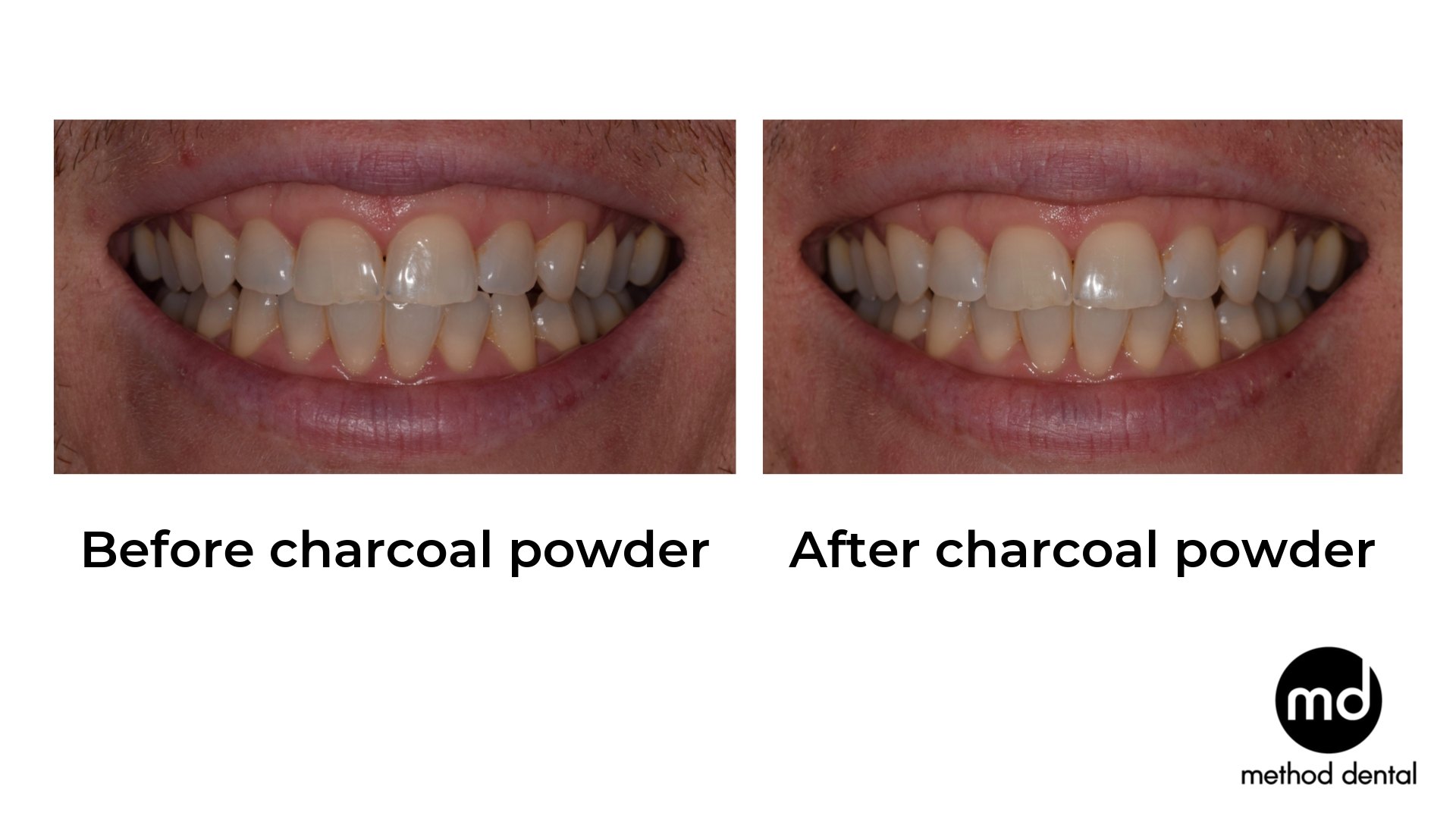
To be honest, I’m not surprised. Charcoal toothpastes as well as a lot of other teeth whitening toothpastes, are designed to remove external stains from teeth. They are best suited to people who drink a lot of coffee or tea, or smokers. That’s because external stains are stains on the surface of your teeth that can be physically removed. For people with only a little external staining, like me, there is no benefit because it can’t whiten the deeper layers of the teeth.
To learn more about the difference between external and internal staining, read here.
And I reviewed super popular HiSmile teeth whitening kit here.
Is charcoal toothpaste safe?
We’ve already established that charcoal toothpastes without fluoride can put your teeth at risk of developing tooth decay. And some research suggests even if charcoal toothpastes were formulated with fluoride, the activated charcoal would absorb the fluoride. This would make the whole point of having fluoride in the toothpaste useless!
But what about abrasiveness? Can these charcoal toothpastes and tooth powders damage your tooth enamel?
The answer is Yes. Yes they can.
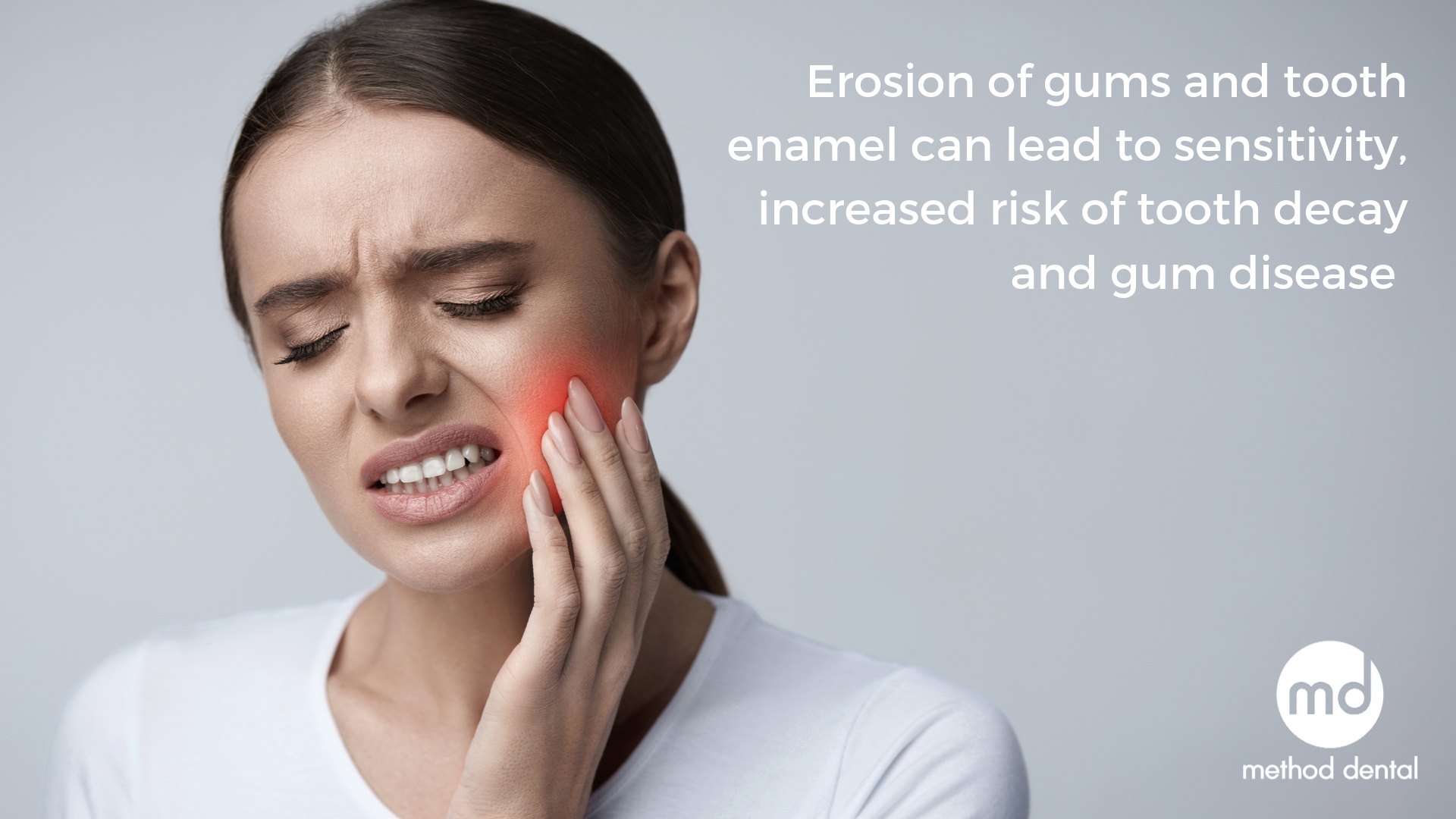
None of the toothpastes and powders I’ve seen have done testing on their abrasively using the measure Relative Dentine Abrasivity or RDA. Products approved by the Australian Dental Association have an RDA score of 250 or less. What score do these charcoal toothpastes have? No one knows, because they haven’t bothered to test it and unfortunately for consumers, they don’t have to.
What we do know, is that they are abrasive in nature and that they have a large potential to do harm to your teeth and gums. More research is needed but there are already many forms of charcoal used in oral hygiene products like toothpaste that have been found to be highly abrasive. This has been pointed out in the review by Linda Greenwall et. al. in May 2019 in the British Dental Journal. This abrasive nature may extend to doing more damage to your gums as well as you strive to brush thoroughly to achieve white teeth.
Is charcoal toothpaste Dr. Grant approved?
So if these charcoal toothpastes can’t whiten your teeth, and will likely damage them instead, I can’t recommend them. There are so many other teeth whitening options available on the market that are safe and actually work.
Don’t put your oral health at risk. And remember to always brush with fluoridated toothpaste.
Dr. Grant McGrath BDSc
Co-Founder
Method Dental


